
The studies Cuba: totalitarianism and Haitinization and 'Totalitarianism in Cuba', signed by Agustín Pantoja, identify state ownership as the key factor in a historical regression process that he has called Cuban haitinization. Pantoja is the fictitious name of a collaborator of the Cuba Siglo XXI ideas laboratory, who hides his identity by residing on the Island. The publication of these essays under his real name would condemn him, the think tank explains, to years of prison, according to current laws.
Regarding Haitinization, the author explains how it is possible that two different countries (Cuba and Haiti) have reached the same point through different paths. In the case of the Island, this Haitinization is noticeable, explains Pantoja, in the increase in inequalities, in the fact that cities that were prosperous, such as Havana, are today in ruins, with the streets full of garbage because the collection does not work, hospitals and schools in deplorable conditions, elderly people scavenging through landfills, housing collapses, transportation crisis, skyrocketing prices, mass exodus and a State incapable of meeting the needs of the population.
"The revolutionary government dismantled civil society, eradicated private property, suppressed freedoms, implemented a totalitarian system with which the citizen, an active and essential agent for social progress, disappeared" and from there to Haitinization has been a matter of time.
In his report on totalitarianism, this historian, political analyst and independent journalist explains three factors that, in his opinion, define the Cuban totalitarian system: the annihilation of private property, corruption and mass exodus. Furthermore, he defends that the "nationalization of property" has led the country to a "multisystemic" crisis, which has dragged poverty to 80% of the Cuban population.
The essayist places among the key dates of the Haitinization of Cuba, the year 1959, when the first Agrarian Reform was approved, in May of that year, which gave land to 100,000 tenants, sharecroppers and precarious workers, but left 40% of the land confiscated from owners with extensions over the 30 caballerías (402 hectares).
Later, in 1960, the expropriation of 381 large companies that were in the name of individuals or legal entities residing in the United States and the nationalization of all private banks based in Cuba was carried out. In 1963, with the second Agrarian Reform Law, 70% of the land passed into the hands of the State, after farms larger than five caballerías were nationalized.
In 1968, 55,000 small and medium-sized companies that were managed by Cubans were liquidated and with this the communists made it clear that the ultimate goal was the nationalization of the economy. Along these lines, in 1975 the State took over 75% of the best lands in the country, under the pretext of starting a cooperative process through which the lands that were in the hands of private owners became cooperatives.
The author highlights the year 1978, with the creation of the Cimex S.A. network of companies, in Panama, as the moment in which the bases for the subsequent transformation of the State into a "mafia State" were approved. This situation continued for 30 years until in 2008, Raúl Castro took control of the country and Gaesa was born, under the command of Luis Alberto López-Calleja, that appropriates, in the name of the State, the most lucrative sectors of the country. In 2022, Gaesa controlled 70% of the economy and 95% of Cuba's finances.
Pantoja does not mince words and concludes that the nationalization of property led the Island to ruin. "In 2022, Cuba produced 460,000 tons of sugar: a figure lower than that reached in 1861. The once largest sugar producer in the world, today it imports it."
Corruption and exodus
Another key factor in the impoverishment of Cuba has been corruption "converted into state policy by Cuban totalitarianism to subdue officials and keep them faithful. The solution, according to the author of the report on totalitarianism, is to "recognize the totalitarian State as the main cause of widespread corruption, restore citizen freedoms, decentralize the economy, and allow the formation of a national productive class."
Finally, the mass exodus that the essayist attributes to an internal cause: the totalitarian model that generates poverty and this loses pressure through emigration that began in the 60s and has increased. In the last two years More than half a million Cubans arrived in the United States.
For the author of the study, "the collapse of the Cuban totalitarian regime is a fact. The attempted solution to the Cuban crisis through changes of leaders or any other cosmetic change is insufficient. The experience of the last century shows that, in Cuba, both its history as well as its culture and its current state, any solution to the current crisis requires structural changes.
However, the way (peaceful or violent) in which this change will occur is considered "debatable." In this sense, he sees as "hopeful" a social movement for The 5 Freedoms against totalitarianism, which proposes ending repression, exile, censorship, liberating productive forces and giving freedom of association.
What do you think?
COMMENTFiled in: